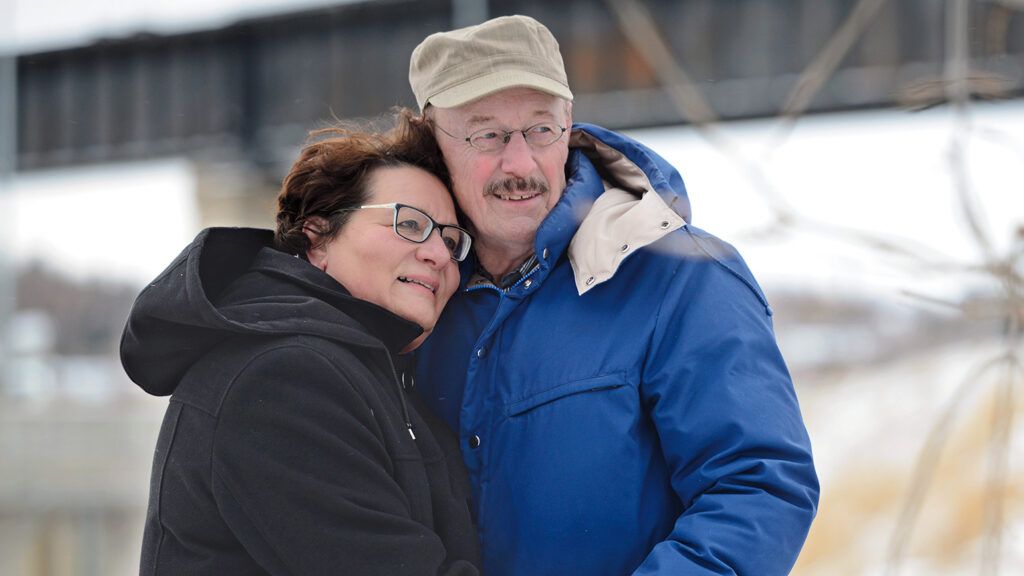One dark, freezing January morning four years ago, I drove to the hospital here in the city of Moose Jaw, Saskatchewan, to say goodbye to my husband, Herb. He was being taken to the only long-term psychiatric facility in the province, some four hours away, in North Battleford. I watched as he was strapped onto a gurney for the ambulance. “I’ll miss you,” I told him. “More than you know.” I was hoping for some sign that he heard me, but he was too sedated to even speak. I gave him a kiss that I knew would have to last a long time. Then the ambulance pulled out of the parking lot, and I followed it for miles through the darkness, until I lost sight of it at a four-way stop. It felt as if I were following a hearse, my husband gone to me forever.
In the fall of 2000, I hadn’t seen any of this coming. Herb had had surgery on his shoulder, which left him unable to do chores on our small farm in rural Saskatchewan for months. The bills kept coming, so we sold our cattle and rented out the farm to neighbors. By the time Herb recovered, we’d decided not to buy into the cattle business again, and he was hired to help with the seeding on our land. I thought it was a good solution, but Herb fell into a cycle of anxiety alternating with depression.
“I feel like less of a man working my own land for wages,” he said. Gone was the vibrant man I’d fallen in love with and married 24 years earlier, the man who liked going to parties and playing cards, who could crack me up with his dry wit. Instead of taking care of things on the farm, Herb sprawled on the couch, staring at the ceiling. He’d always been such a neat and stylish dresser that I’d called him Mr. Perfect, but here he was moping around, slovenly and unshaven.
Before my marriage, I had worked as a psychiatric nurse, and I was sure God was giving me a chance to use my training. I thought Herb had situational depression, that I could heal him. I held his hand and encouraged him to share his feelings. “Let’s see if we can turn those thoughts into something positive,” I told him. “There’s not one positive thing in my life,” he said, looking down at the floor. When he was anxious, I tried to calm him by saying, “Just focus on the present moment.” “But the present is unbearable,” he said, following me from room to room, wringing his hands and crying.
Nothing I did made a difference. Several times Herb was admitted to the community hospital for his own safety. His pacing and pleas for someone to end his pain disturbed other patients, so he was kept sedated. I realized he needed more help than I could give, more than our rural hospital could provide. The closest hospital with a psychiatric unit where Herb could get regular care was in Moose Jaw, about five hours away. It was too expensive to travel back and forth. Our only option was to move to the city. By the grace of God, in the fall of 2004, we found a house we could afford just minutes from the hospital. I got a job as an assistant nurse in an extended care facility for seniors.
In the years that followed, Herb was rushed to the psychiatric unit many times. I lost track of how often the police responded to 911 calls because Herb told the operator, “I can’t live like this anymore.” I was terrified to leave him alone. I even changed my work schedule so that I could be with him during the day. I’d work the overnight shift, come home and sleep for a few hours until he got up at noon, then start the cycle all over again. Every time I had to get groceries or go to an appointment with my own doctor, I’d say, “I need to leave the house for a bit. Will you be all right?”
I would pray that he would be okay, but I’d often come home to find Herb had called 911. His psychiatrist put him on more pills, different pills. Herb underwent electroconvulsive shock therapy, transcranial magnetic stimulation. He would be released from the psychiatric unit feeling better, but the respite never lasted. Within six weeks, he would suffer a relapse of depression.
By the time Herb was sent to the long-term psychiatric facility in North Battleford, in 2015, I’d been fighting his demons for more than 15 years, and I knew I’d reached my limit. I was like the proverbial frog in the pot of hot water: I didn’t realize I was boiling until the heat had been turned all the way up. I called once a week to check on Herb, but I mostly spoke to the nurses. I didn’t talk to Herb much; it left him agitated and me in tears. I couldn’t even bring myself to visit him for the first several months because I was afraid they’d make me take him home when he wasn’t really well yet. Then I felt guilty for thinking that.
My sister urged me to join a grief group at the hospital in Moose Jaw. “You need to work through your feelings,” she said.
“Grief counseling when nobody has died is ridiculous,” I said. My sister kept pushing. Six weeks after Herb went to North Battleford, I decided to attend one meeting to get her off my back. Just one.
In the meeting room, a dozen chairs were arranged in a circle. I wanted the chair closest to the door so I could slip out, but a woman snagged it. The facilitator introduced herself as Ellen.
We went around the circle, sharing why we were there. One man had lost his daughter in a drowning. Another was grieving the death of his wife. Then it was my turn. Would everyone wonder why I was here when my loved one was still alive? “My husband is in long-term psychiatric care,” I said. To my surprise, people nodded sympathetically. It turned out that four of the 12 were dealing with problems other than death. Judy, the woman who’d taken that chair by the door, said she was grieving the loss of her childhood after having to care for her younger siblings. She looked to be in her sixties, like me.
Ellen pointed to a basket of rocks on the table in the center of our circle. “Everyone, take two rocks,” she said. “Now I want you to write in permanent marker a feeling you want to keep on one rock, and on the other, in washable ink, a feeling you want to get rid of.”
I wrote “hope” on one because hope was all I had left, not that there was much of it at this point. I wrote “resentment” on the other rock. Ellen asked us to explain the feelings we’d written on our rocks. “I resent Herb for…leaving me,” I managed to say. “That he’s not around for our children and grandchildren. That I have to take care of everything.” It was hard to get the words out, but it was a relief too.
Ellen wrote on a whiteboard the five stages of grief: denial, anger, bargaining, depression and acceptance. “You might hit the stages at different times and in a different order,” she told us, “and some stages may resonate with you more than others.”
When the first session was over, our group went out for coffee. We chatted about what we’d learned that night, and I knew then I would be coming back. I felt supported by these strangers already. Judy leaned in close and asked what the last straw had been for me. “When I found Herb banging his head against the wall in the hallway, repeating, ‘I can’t take this anymore’ with every bang,” I said. That was when I’d realized we had to leave the farm and move to the city, where he could get better care.
The next week, our group tackled the stage of anger. Boy, did I have a lot to say then! I was angry at Herb for leaving me to clean up the mess his illness had made of our lives. I was angry that neither he nor most of our friends and family seemed to understand what I’d been going through all these years, caring for him and worrying that he’d take his life. I was angry at myself. Maybe things would have been different if I’d recognized right away that Herb was suffering something far deeper than situational depression. I was angry with the people who said I should let go of Herb and move on with my life.
Finally, I was angry that my faith was being tested so severely. I told the group about Nebuchadnezzar in the Book of Daniel: Nebuchadnezzar had lived with madness for seven years before God rescued him. I said to God, “You gave Nebuchadnezzar back his sanity, and I want the same for Herb!” I asked why Herb—and I—had to suffer so much longer. But maybe even God was tired of me begging for help.
The stage of depression too hit home for me. The constant roller coaster of caring for Herb had taken its toll. I was a bag of nerves and even experienced brief bouts of depression myself. I couldn’t imagine what it was like for Herb, sinking into that dark pit of despair with no end in sight. “Laugh, and the world laughs with you; weep, and you weep alone,” the poem may go, but not so in the group. I was so burned-out that I thought I couldn’t even cry anymore, but I found myself in tears over their stories. I felt their pain, and I knew that they could feel mine. Thank goodness we could express our feelings in the group and not be judged. For the first time in a long time, I actually felt my feelings instead of pushing them down.
For homework, Ellen asked us to write down the warm memories we had with our loved one. At first, all I could think of were the encounters with the police and being afraid to leave Herb alone, for fear he’d kill himself. I had to really pretzel my thinking into the positive to remember the good things: the births of our three children, farm parties and playing cards with friends, trips to the lake on summer afternoons. The more I wrote about happy times, the more I was able to see how blessed I’d been to have had so many good years with Herb. He’d been such a devoted husband and father.
The last stage, acceptance, I struggled with. What if Herb never got better? What if he never came home? I might have to live without the man I loved for the rest of my life. I might end up alone, no one sharing my golden years, no one to sit with in our rocking chairs and enjoy visits from our grandchildren. How could I accept that? I talked about how I’d felt I was experiencing a death of some kind when I was following the ambulance that took Herb away from me. The group helped me see that it was the end of my life as I knew it and, by acknowledging that, I was already in the process of accepting it.
Shortly after I’d begun the grief group, our son, Ray, invited me to go to his church with his family. I met the Young at Heart, a group of seniors who invited me to potluck suppers and to game and movie nights. The Young at Heart surrounded me with God’s love, and I felt encouraged to hope again for the future, no matter how uncertain.
At the end of the eight weeks of the grief group, we walked to the bridge behind the hospital and flung our rocks with the feelings we wanted to let go of into the water. I watched as my “resentment” sank to the bottom and made ripples radiating to the bank. I felt more at peace than I had in years.
Herb had been in North Battleford for a year when he called me and was able to carry on a conversation. He’d been put on a new combination of medications, and it was as if a switch had flipped. He asked about our family, something he hadn’t shown interest in for years. At last, after 20 months away, he came home. More than two and a half years later, he hasn’t had a single relapse. We’ve both changed under the weight of all those years he was ill, but for the most part, the kind and spirited man I married has been returned to me, the loving husband and doting father and grandfather. Now he’s the one who keeps the list of family and friends’ birthdays and anniversaries, making sure we don’t miss out on anything. He even carries on with our children on Facebook.
We hold hands and pray aloud together every morning. We pray for those we know who need God’s intervention, and then we say, “Thank you for our physical and mental health.” We know that we are not promised these precious things forever, but Herb and I are filled with gratitude for the present.
For more inspiring stories, subscribe to Guideposts magazine.






